-
A young Ukrainian journalist takes a stroll through Kiev
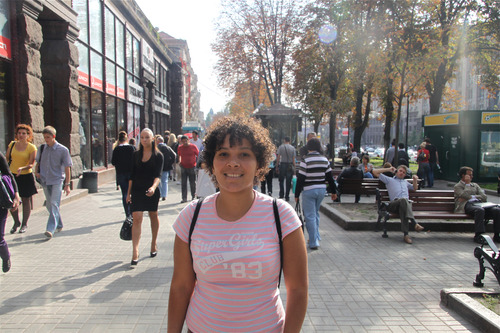
Editor’s Note: This blog post is part of a photo journalism series of black Ukrainians and other African diasporas in the former Soviet Union region. Today, I will feature Antonina Gensyor, a black Ukrainian (or mulatto). This is a snap shot into her life here in Ukraine. We took a stroll around downtown Kiev on Friday, September 17th, 2010. A longer story of her life is forthcoming.
She comes across as a shy girl, but her profession demands forwardness. As a journalist in Kiev, Antonina Gensyor, 27, covers everything from politics to culture. But her favorite topic is music. Rock music to be exact.
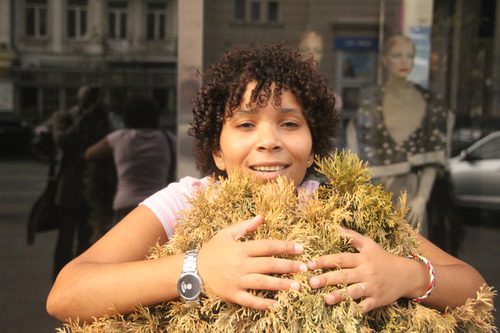
She was born and raised in Odessa, a major port city in eastern Ukraine. Antonina moved to Kiev in 2000 to enroll in the Taras Shevchenko Journalism Institute. Her father is from Burkina Faso and her mother is Ukrainian. Document and other issues forced him out of the country when she was a young child, so she doesn’t remember much about him. But Antonina still talks to him once a month or so, though she says his remote location in Burkina Faso makes their communication challenging.
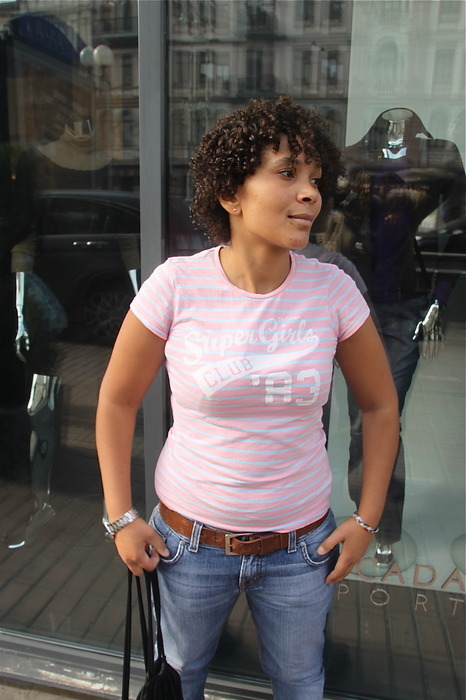
For Antonina, being a black Ukrainian isn’t so hard. But, sometimes, people don’t think she’s Ukrainian at all.
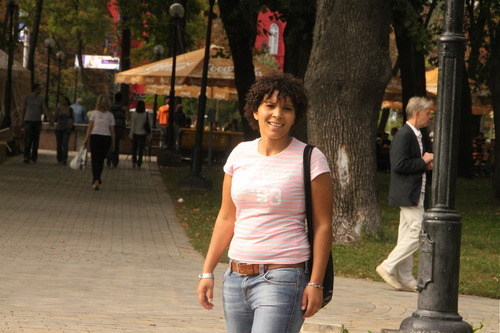
When she was a university student, Antonina says people always assumed she was a foreigner. She often found herself explaining her parentage to her classmates. There were many foreigners enrolled in her journalism institute, so she understood their reasoning, she says.
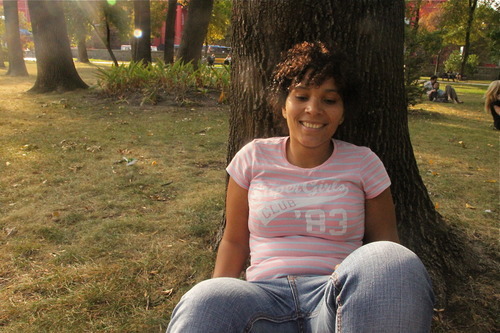
Her days in elementary school days, however, weren’t so comfortable at times. “I was the only mulatto in school for a while,” she told me. “The other kids would call me "Negrochanka” or “Chunga Changa.” I asked her whether she felt the kids were trying to insult her. She said it depended on the context. But generally, she was never comfortable with the terms, harmless intent or not.
Interesting Note: This link below goes to a very famous cartoon called “Chunga Changa.” its a Soviet Era cartoon which was targeted to Soviet children, telling of the “exotic lands” of Africa. The kids who called Antonina “Chunga, Changa” were referring to this song. There is not English translation, but all of the Russian speakers can join in to help out.
http://www.youtube.com/watch?v=KWGovsuRWYM&p=FCC65F03540F700C&index=2&playnext=2
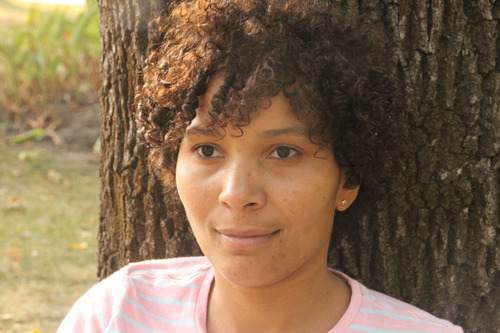
Antonina has an older brother, also a black Ukrainian, who lives in Odessa with his Ukrainian wife and their child. So she’s in the big city all by herself, she says with a smile.
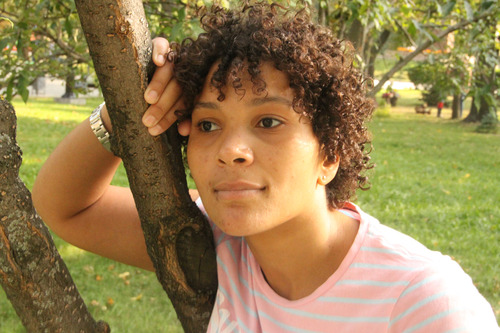
Antonina feels optimistic about the future of mulattos in Ukraine. Eventually, her country of birth will be a place where people with her skin tone will lead promising futures and color is less of an issue than it is now. Let’s hope, not only that Antonina’s correct, but that such a time comes sooner rather than later. -
From Soviet Red, two black Ukrainians were born
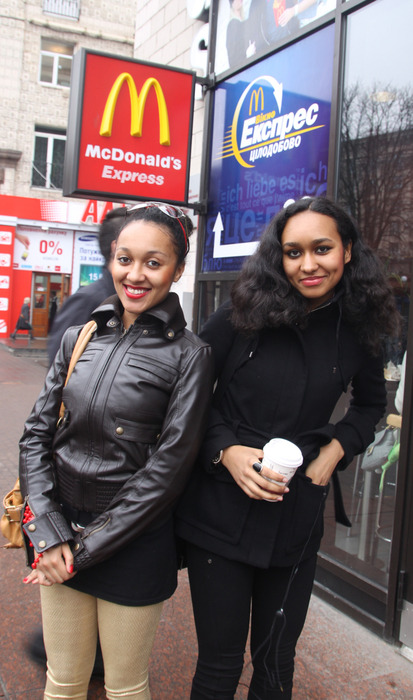
Editor’s Note: Angelina Diash,left, and Violanta Bernardu, right, are subjects of an in-depth photo journalism series I am conducting for my Fulbright Scholarship. I recently penned a feature story of these two black-Ukrainian women for The Crisis magazine. The follow blog post is a brief snapshot into their lives and how they feel about being black and Ukrainian.
If you saw Angelina and Violanta walking down Lennox Ave. in the sea of other black faces that hustle and bustle back and forth through the streets of Harlem, you’d think they were everyday New Yorkers. But neither has ever been to the Big Apple. Nor are they African-American.
Their roots are firmly planted in the slavic lands of Ukraine. But for most of their lives, Angelina and Violanta have found it difficult to reconcile their slavic roots with their African heritage. It hasn’t been an easy journey for either.
Born to Angolan fathers and Ukrainian mothers on the tail end of the USSR’s collapse, these two young ladies epitomize the inadvertent consequences of Soviet Cold War foreign policy. The African men who helped give them life arrived in Soviet Ukraine during the mid-1980s on Soviet academic scholarships. It was then when their fathers met their mothers (who were sisters, which makes Angelina and Violanta cousins but they always refer to themselves as sisters), and married them.
But they know little of the African side of their families. Angelina never met her father as he died when she was a small child. Violanta’s father, a man she’s never met, lives in Brazil. They communicate via email. One day she hopes to meet him.
The Mc Donalds they’re standing in front of in the photo above has symbolic value to them. When President Obama won the 2008 presidential election, they saw someone who represented them-even though their passports say otherwise. Since they couldn’t be in Chicago, they figured McDonalds was the most American place in Kiev where they could rejoice in knowing that one of their own had made it. He was bi-racial, like them. A man who didn’t run away from his black heritage. A man whom they can now point to when they need to repel racism.
“When people will tell us that black people are not intelligent and their place is in a palm tree, we will say no,” Violanta says with pride. “Their place is in the White House.”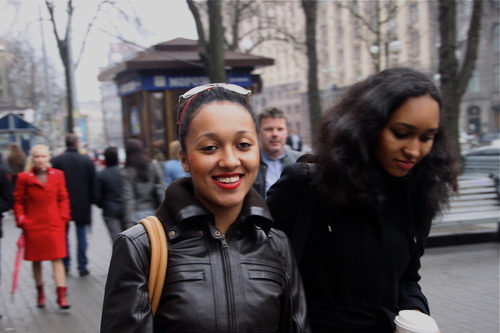
Their place is Ukraine. Their place of birth. But Angelina, left, says she doesn’t always feel at home. During her first year in university, she says her new classmates didn’t believe she was Ukrainian. It was only when she broke out her fluent Ukrainian that they actually believed her.
“They were really shocked,” Angelina says of her classmates’ reaction to her linguistic abilities. “‘Oh! She knows Ukrainian! Oh my God!’”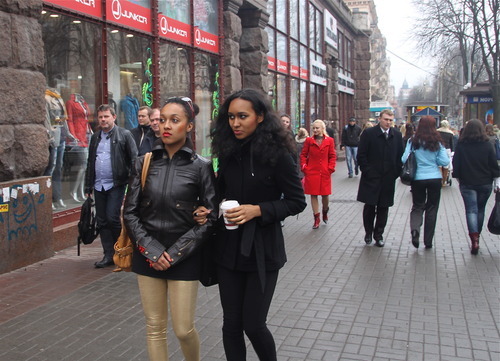
But only a year later, she was to experience a shock of her own. During a psychology lecture with a class of 100 other students, Angelina’s head was buried in her notebook taking notes until her professor utter a claim that made her pen stop on a dime.
“People of mixed race backgrounds have ‘a bad gene.’ This bad gene, Angelina recalls the professor saying, “’causes mix raced people to become criminals.’”Shocked and embarrassed, she confronted her professor and demanded that she defend her words. “’Oh I read this book and that’s where I got it from,’” Angelina recalls the professor saying. That answer wasn’t good enough.“Who is the author? I want to know,” Angelina demanded. “I want to read this book. Tell me.”She never could really defend her choice of words. Though, oddly enough, Angelina says her professor, for reasons she isn’t sure of, later apologized-in private, of course. Yet, Angelina is certain she still doesn’t get it."You must marry a black man. See Barack Obama. He took a black woman,” Angelina recalls her professor telling her after apologizing for the lecture room episode. “He’s a mulatto, but he took a black woman. He’s a very intelligent man and he didn’t want to spoil the genes of his children.” (In America, mulatto is viewed as an antiquated term but it’s commonly used here in Ukraine to describe Afro-Ukrainian peoples).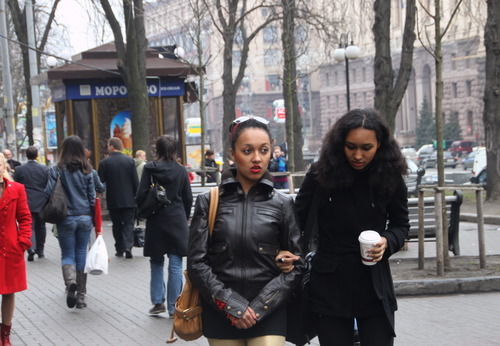
When Angelina is not in class, she is very active with women’s rights issues and models on the side as well. She’s very outgoing and has many friends.
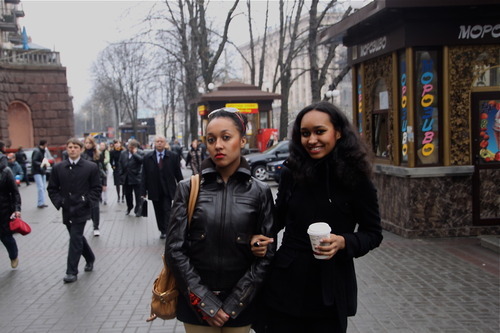
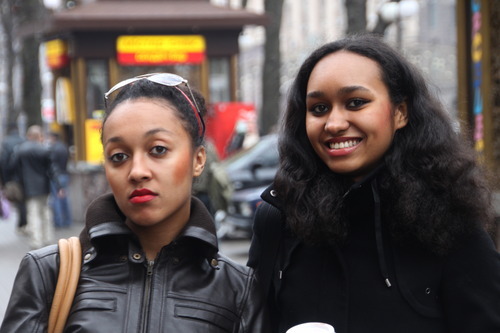
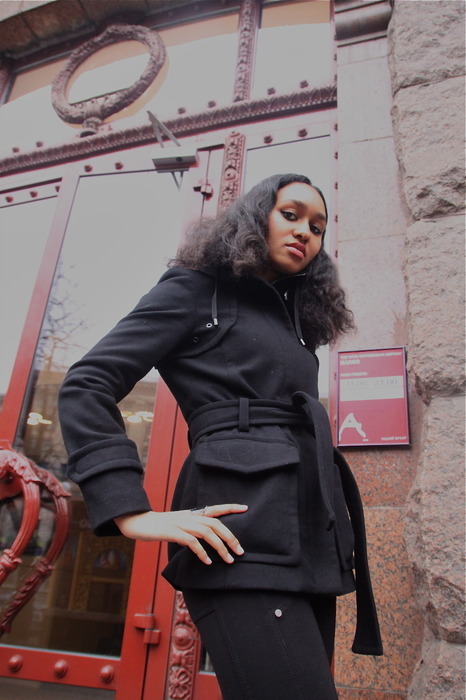
Currently, Violanta is in Kentucky on a U.S. scholarship as an undergrad for a year at small liberal arts college. Like her sister, she is fluent in Russian, Ukrainian and English. When I first met Violanta back in March, she was sporting multi-color Air Force One style sneakers, stylishly well-fitted jeans and a knitted sweater. There wasn’t a day I saw her when she didn’t look fly. While in Ukraine, she attended a modeling school and hopes to one day grace the catwalks of Paris and New York. But her goals aren’t only glitz and glamour.
A political science major, Violanta hopes to one day start an organization in Ukraine that fosters cultural understand between white Ukrainians and minority groups in the country. Its something she feels is essential in a country generally unaccustomed to non-slavic peoples-especially those of African descent.
Prior to leaving for the U.S. last month, Violanta had never set foot outside of Ukraine. Yet, she feels like a foreigner in her own country at times. These feelings were sown into her psyche at a very young age.
“You are African. You’ll freeze. You’re not like us,” was a constant refrain Violanta and her cousin Angelina heard from little boys as they walked to and from school. They were only six and seven years old, respectively. And to make matters worse, the parents of these little boys weren’t any better.“Look! They’re not like us.”“They are Negros.”“They are black.”“They aren’t supposed to live in our country.”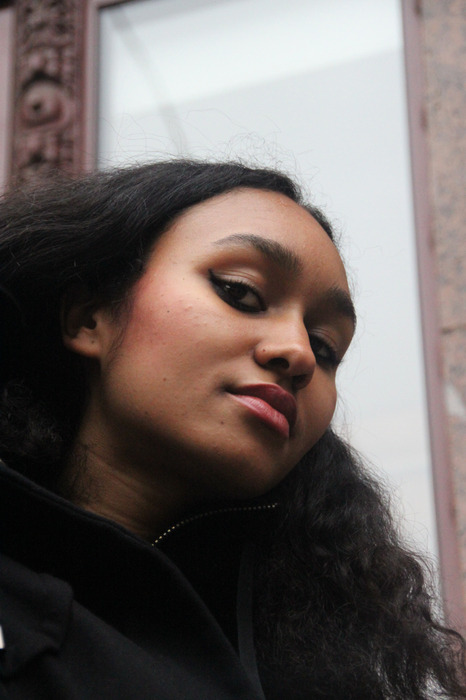
Those words have stayed with Violanta and the more she endured the label of foreignness her countrymen and women bestowed upon her, the more she connected with her black side and less with her slavic one.
Before she was awarded her scholarship to study in America, Violanta expressed great interest in learning about the African-American experience.“I want to learn more about black people, I want to have a chance to visit some ghettos, some places where only black people live so I can feel myself as a black person,” she said. I’m not sure what kind of ghettos she’s referring to, but I hope she has a well-respected escort when she does decide to take a ghetto tour! I don’t think such tours are on the Smithsonian’s schedule.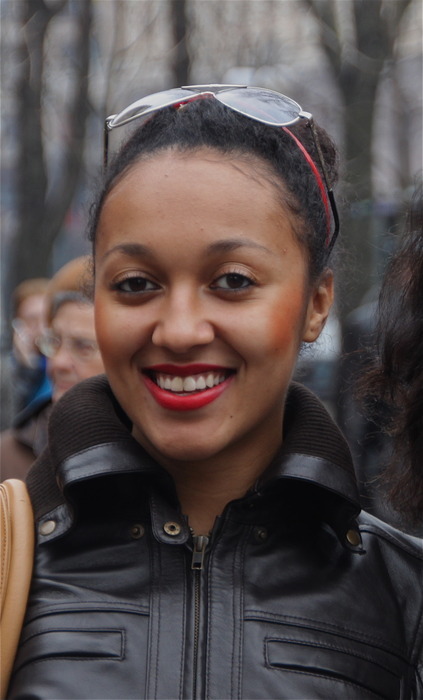
As for Angelina, she’s proud to be Ukrainian, but leans more towards her African roots. She too wants to study in America like her cousin and learn more of the black American experience, hoping she will learn more about herself. As for the painful experiences she’s had with racism throughout her life, they’ve done little to break her self-esteem. “I’m a black girl,” Angelina said smiling. “I’m very proud of who I am.”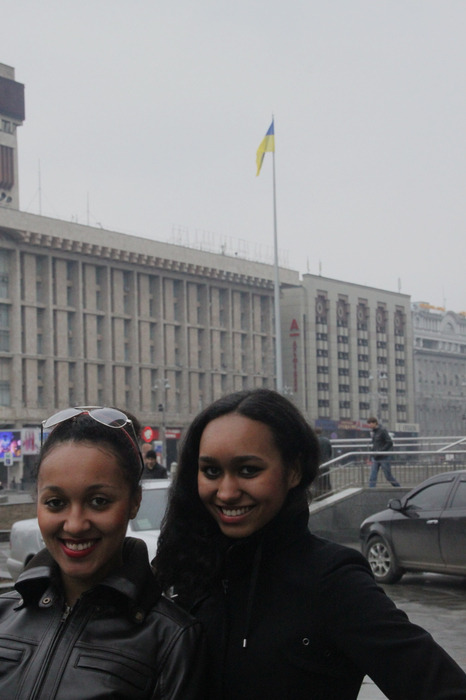
Over the months I’ve known Angelina and Violanta, I’ve grown attached to them and them to me. Violanta, for example, calls me "chocolate bear” or “brother."
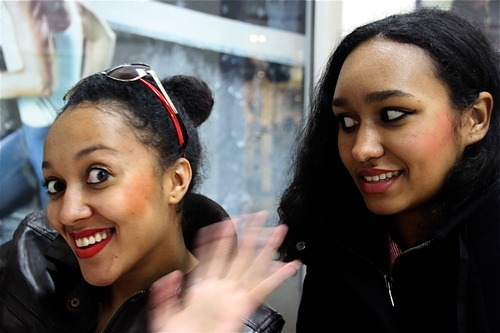
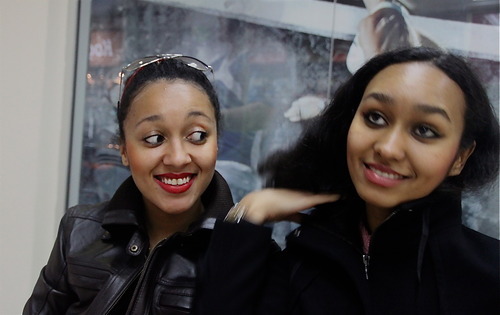
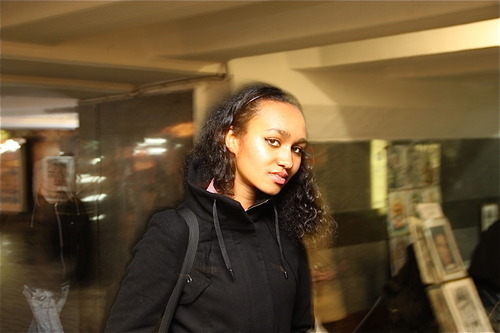
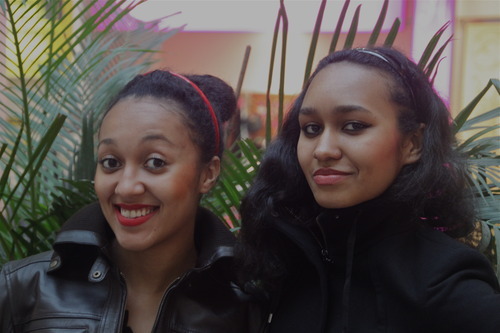
This is a quick snapshot of their lives. There’s more to them, of course. Over the next few weeks, you’ll learn what that more is.
Friday, June 10, 2016
Black Ukrainians
Subscribe to:
Post Comments (Atom)

I just want to thank you for sharing your information and your site or blog this is simple but nice Information I’ve ever seen i like it i learn something today. Escort sites in Uruguay
ReplyDeleteThanks for sharing content and such nice information for me. I hope you will share some more content about. Please keep sharing! Chinese Sex Videos
ReplyDelete